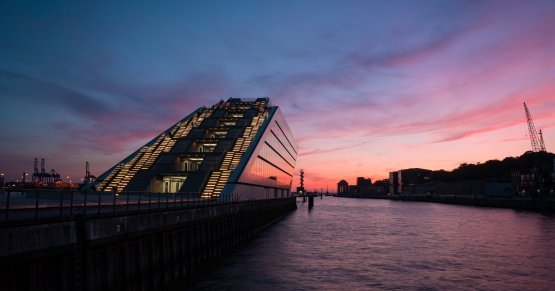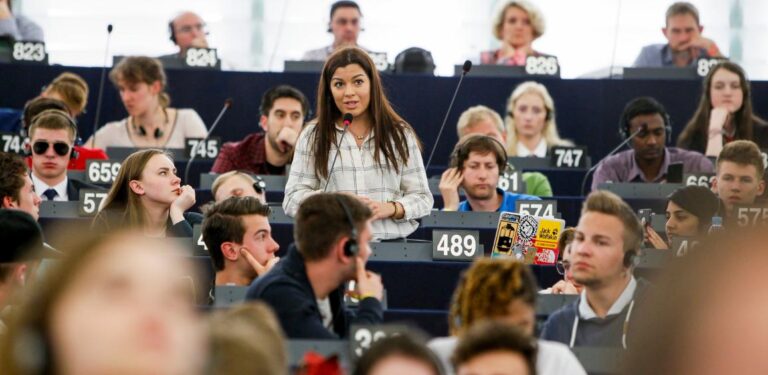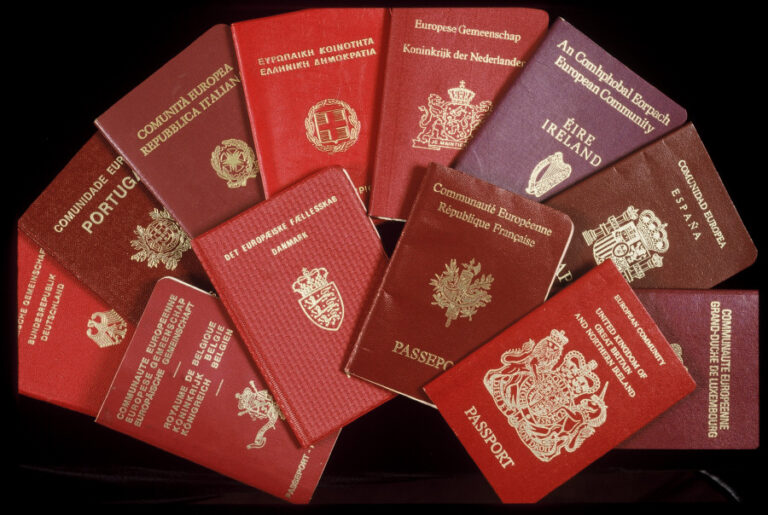
In his memorable speech at the Sorbonne on 26 September 2017, the French President Emmanuel Macron presented a well-structured and convincing plan for relaunching the project of European unification, which has basically been on hold since the 2008 financial crisis. In this article I do not intend to discuss all of his proposals, which I myself agree with, but rather to comment on the concept of European sovereignty, which Macron indicates as an ideological objective for the future of the European Union.
In one part of his speech, Macron stated: “The […] key to our sovereignty is industrial and monetary economic power”, in short, the Economic and Monetary Union. At other points he proposes a “Defence Europe” and a “European defence fund”. Concluding, he summarizes his proposals as follows: “Finally, the essence of the European project is democracy. … For Europe, sovereignty, unity and democracy are inextricably linked. … We must promote this indivisible triangle”.
Here, I mean to show that while “unity and democracy” are two of the main pillars supporting the European project, the concept of European sovereignty is misleading: it would be more accurate to say “the powers and competences that must be entrusted to the democratic government of the Union by member states”. The concept of sovereignty is an ideological notion which is closely linked to the birth of the nation state and which cannot serve as a guide for the future of the EU.
I will present the reasons for this empirical approach in two stages: in the first I will indicate some contradictions between France’s foreign policy, still based on national sovereignty, and the notion of European sovereignty; subsequently, I will discuss the European Union’s foreign policy, a policy crucial to halting and reversing the trend towards growing international disorder, exacerbated by Trump’s nationalistic policies.
In a recent interview with Le Grand Continent (16/11/2020), Macron was asked “Can Westphalian sovereignty coexist with the climate crisis?” To which he replied: “Yes, because I have not personally found a better system than Westphalian sovereignty. If it is the idea of saying that a people in a nation decides to choose its leaders and have people to pass its laws, I think that is perfectly compatible because otherwise who is going to decide? How would the people get together and decide? … For decades now, Western democracies have been making their peoples feel that they no longer know how to solve their problems. …That is the crisis of democracies: it is a crisis of scale and efficiency. But I do not believe at all that it is a crisis of Westphalian sovereignty. … In everything I do internationally, for me what is paramount is always the sovereignty of the people”. There is no doubt that national democracies around the world are in crisis, but the answer cannot just be to boost the effectiveness of national democracies, because when the international order breaks down, as happened between the two World Wars, democratic regimes are no longer able to respond effectively to international challenges, be that economic security (as happened with the 1929 depression) or military security (to curb hegemonic projects like Hitler’s). Democracy becomes fragile when authoritarianism advances. Contemporary nationalism has emerged in increasingly aggressive forms since the fall of the Berlin Wall and the breakup of the USSR. Macron does not understand the root causes of the crisis of the international order and therefore supports the foreign policy of France, as a national state, which actually prevents the construction of an independent European Union. French national policy has the effect of preventing the pursuit of “strategic autonomy” for the EU, a concept that was adopted many years ago as the basic orientation of the Union’s foreign policy.
We can observe the recent consequences of France’s foreign policy in two crucial areas, the Mediterranean and Eastern Europe, including Russia. When it comes to Libya, France supported General Haftar against Al-Serraji, thus favouring the intervention of Turkey and Russia in the region; in Lebanon, he attempted to cast France – rather than the EU – in a peacemaking role, ultimately to no avail, and in the Nagorno-Karabakh War, between two states that belong to the EU-promoted Eastern Partnership (EaP) – the European Union stood out for its absence, thus giving Turkey and Russia an opportunity to further extend their influence in the Caucasian area. Why is the EU unable to act effectively in these regions? According to Macron: “We have built European defence capabilities, although it was thought unthinkable” (LGC). The reality is different, as Josep Borrell clearly demonstrates: “In conflicts such as Nagorno-Karabakh, Libya or Syria, we are witnessing a form of ‘astanisation’ (in reference to the Astana format on Syria) which leads to Europe’s exclusion from the settlement of regional conflicts in favour of Russia and Turkey. Nature abhors a vacuum: we risk now seeing Russian and Turkish military bases being established in Libya, a few kilometres away from our coasts. In order to emerge from this situation and to be able to settle our conflicts peacefully with these new empires built on values that we do not share, we must continue to fill the gaps in our common defence capabilities. This is the price which must be paid to give birth to the geopolitical Europe that President Von der Leyen and the European Commission have called for” (Le Grand Continent, 14/12/2020).
Now let’s look at the issue of the defence and security of the Union, which means talking about the future of NATO. In his interview with LGC, Macron was undoubtedly aware of the proposal from Germany’s SPD party to create a 28th Union Army, namely a European army at the disposal of the democratic organs of the EU. Yet he does not mention it, as if the question of European defence had already been solved. Perhaps Macron believes that French defences, which also include nuclear weapons, are sufficient to guarantee the security of the other countries in the Union, a doctrine that goes back to de Gaulle. Yet this sentiment is not shared by Eastern European countries such as Poland or the Baltic nations, which look to the United States and NATO for protection. Macron criticizes NATO’s shortcomings, as he did in 2019 when he argued that the Atlantic Alliance was experiencing “brain death”. This criticism is justified, but what alternative does Macron offer? The SPD proposal would effectively achieve the “strategic autonomy” of the EU. Here it would take too long to go into the details of an issue that is undoubtedly key to Europe and for world peace. I will merely recall the contents of a ‘Policy paper’ written by three federalists entitled A New Atlantic Pact. A Peaceful Cooperation Area from Vancouver to Vladivostok (The Ventotene Lighthouse, 7/10/2020), which considers – and updates – Gorbachev’s 1987 proposal for a “Common European Home”. This proposal was abandoned after the break-up of the USSR, because European and US policy for the eastward expansion of NATO – despite Kohl promising Gorbachev otherwise – ended up compromising relations with Russia: Russia had initially been invited to join NATO in the Partnership for Peace (PfP), to launch a more intense form of economic and military cooperation, later interrupted by the crisis in Ukraine, disputed between Europe and Russia. The paper argues for the need to resume peaceful cooperation with Russia, inviting it to participate in a free trade area from Vancouver to Vladivostok, and re-enter the PfP until the time is ripe for further steps. The paper also proposes creating a European security system based on a “dual army”, a proposal similar to that of the SPD. More peaceful relations between the EU and Russia would indirectly contribute to changing international relations between the EU, the US, Russia and China, and reducing the level of nationalistic competition between the great powers.
European foreign policy, however, is not limited to Euro-Atlantic relations. There are global political challenges which urgently need to be addressed. The mob attack on the US Capitol was not only a vulgar insult to democracy, but is also indicative of the further weakening of US leadership in the world, because in the coming years the US is likely to be divided internally by social and political rifts. The international institutions created after the Second World War were designed by the US to guarantee “a safe world for democracy”: the UN charter is based on “Westphalian sovereignty”, but contains rules to mitigate conflicts, through the Security Council, and a number of agencies to support economic stability (the IMF, the World Bank, the GATT), health (the WHO), agriculture (the FAO), human rights, etc. This architecture, which was based on multilateralism as the US wished, and was originally accepted by 40 other countries including the USSR – withstood the crises and turmoil of the Cold War. However the break-up of the USSR heralded an ongoing erosion of the post-war order, and the emergence of new global powers, such as China, Russia, India, Japan and Brazil, etc., was inevitable, giving rise to a multipolar system with no world government. Trump’s policies have shown that the US prefers bipolarism to multilateralism, an approach that benefits the stronger country. This return to conflicting international relations will continue in a different form even under the Biden administration, because there are currents in the Democratic Party that are in favour of protectionism and nationalism.
If the European Union proves unable to contain the nationalist leanings of the major powers, it will face a global challenge which could have dramatic consequences. A relentless struggle for world hegemony would end up bringing down the European construction. Each European country that wants to maintain its sovereignty in foreign policy, as Macron does, will be drawn into the hegemonic orbit of one or another major world power. To face this challenge, the European Union must equip itself with effective capacity for foreign policy that goes beyond what is currently in place, as the EMU; i.e. a European defence force (the 28th EU army) and a reinforced European budget, because foreign policy also requires fiscal capacity. The European Commission, endowed with new powers, would be accountable to a two-chamber Parliament (the EP and the Council of Ministers voting by a majority).
This reform is possible, but in the meantime some global challenges need to be addressed through the existing institutions. The first is the Glasgow Climate Conference on 1-12 November 2021. The EU will be appearing at this important event as a world leader, thanks to the launch of the European Green Deal which – in addition to the positive results achieved in the past (from Kyoto onwards) – represents a pioneering foreign policy initiative (global CO2 emissions: China 28%, USA 15%, EU 9%, India 7%, Japan 3%). Multilateralism can no longer be guaranteed by a hegemonic superpower, but will have to be built gradually through peaceful cooperation – a global governance by the major players of world politics. Among these, the EU stands out as the leading power in a select number of forward-thinking countries (about a hundred) in favour of a global plan for the sustainable development of the planet. Security policy in the twenty-first century – the century of the Anthropocene – no longer depends solely on the military might of each power, but on their ability to guarantee a sustainable future, as indicated by the Global Development Goals (UN 2015). Over the past decades national governments have passed the burden of the structural adjustments needed to combat climate change onto future generations. Now, the young people of Fridays for Future and Extinction Rebellion are demanding a sustainable future. The human species, like other animal species, could become extinct if we fail to meet the objectives agreed in Paris in 2015 (to limit the level of global temperature rise to 1.5°C above pre-industrial levels). We are now approaching 2°C; if this trend is not halted by the end of the century we will be looking at an increase of 4°C, with devastating consequences for all forms of life.
Preparing for COP 26 in Glasgow will not be easy. The major world powers need to accept strict limits. The new Biden administration is taking an ambiguous position in this regard: while it has declared that it is in favour of the Paris objectives, it has launched the idea of a summit of democracies that could end up having overtones of the Cold War, if understood as an anti-Chinese alliance. China’s environmental policy is also ambiguous: its commitment to achieving CO2 neutrality by 2060 is positive, but in the meantime the Chinese government is financing the construction of coal-fired power plants both in China (17 new plants) and beyond, with a few hundred in Turkey, Vietnam, Indonesia, Bangladesh, Egypt and the Philippines, thanks to the Belt and Road Initiative. The negotiations ahead of the Glasgow conference will have to address these problems. The battle is on. If there is the will to do so, it will be possible to achieve the goal of CO2 neutrality by the middle of the century. However, past experience suggests caution. No matter how many promises governments make, without a binding form of coordination on a global scale it will be unlikely that national environmental plans are respected. The practice of passing the buck onto future generations could continue.
The European Commission has managed to relaunch European cohesion among the 27 thanks to the Next Generation EU plan, perceived by European citizens as a European public good. This initiative has beaten back national sovereignty in the various political formations. A similar proposal should be adopted in the run-up to Glasgow, so that international political cohesion is guaranteed by there being obvious advantages to cooperation, an added benefit that each UN country can acquire by signing up for a World Green Deal in good faith.The world plan should be based on the use of Special Drawing Rights (SDRs), a kind of world currency issued by the IMF, as UN Secretary Guterres has proposed. This first initiative, crucial for economic stability, should be accompanied by a tax on the profits of multinational companies to finance the World Green Deal. Global sustainability will only become effective if poor and emerging countries can work harmoniously: the efforts of each single country should be teamed by collective hope for the future. More aid for development, a boost for renewable energies and strengthening the WHO to combat the pandemic effectively will help reduce the gap in wealth and well-being between the world’s rich and poor. Contrary to what Macron believes, the UN can and should be endowed with supranational powers. This is the first step towards a post-Westphalian order.
The return to multilateralism is obviously about more than just environmental policies. There are other crucial problems, such as atomic and conventional disarmament, the regulation of international trade and finance, respect for human rights, etc. Ultimately, the goal should be to reduce nationalistic conflicts between the great world powers to create a global governance, a key objective when it comes to saving democracy threatened by national sovereignty in every country.
In this article I have deliberately avoided a doctrinal discussion of the relationship between the concepts of sovereignty, state and democracy. Treaties on international law and international relations devote much attention to these issues. I merely wished to show that we can tackle the problem of the European Union’s foreign policy and security without resorting to the hackneyed concept of sovereignty. In the century of the Anthropocene, what sense is there in striving to defend the sovereignty of a single nation, or Europe as a whole, when the future of humanity is at risk? Sovereignty is a political concept that came about to foster the creation and consolidation of nation states. Today this archaeological relic should be left in the hands of the nostalgic custodians of the past.


